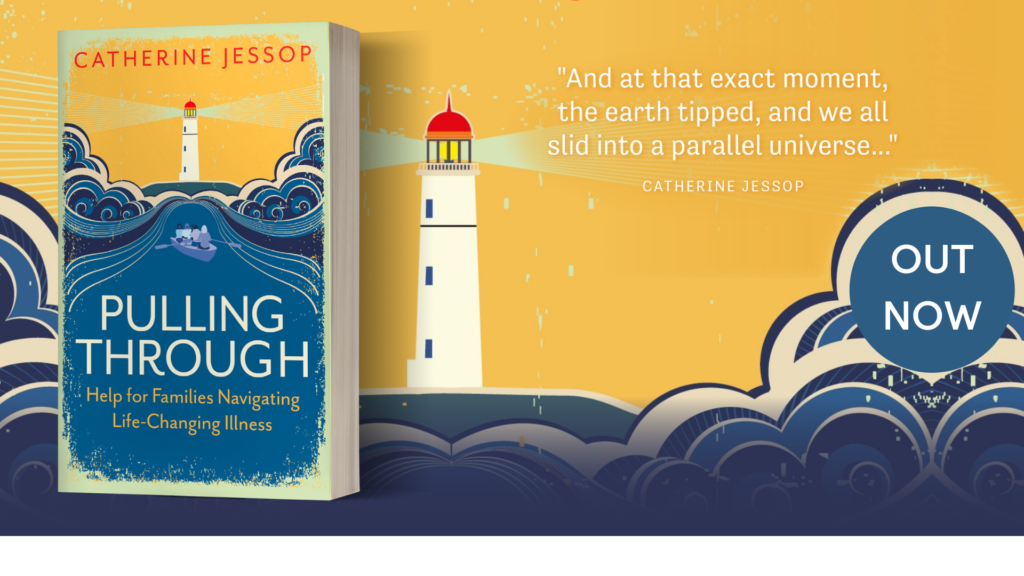At Christmas most families are looking forward to making memories. But what if you literally can’t?
On Christmas Day 2016, the Jessops were just an ordinary family, but on Boxing Day, one near-death experience swept them all into the bewildering world of hospitals and serious illness, and their lives changed forever. Catherine Jessops writes about her experience of navigating life-changing illness.
I wake Alan at 9am. And as always, when I do, he has no inkling what day, month or year it is. He has no notion of what he was doing the day before or indeed what he will be doing that morning. But more than that, he has no knowledge of how severely limited his brain power is. “What time do I need to be in the office today?” he says. He hasn’t worked since 2016. “I wonder where my car is?” he ponders. He can no longer drive. “When are the kids home from school?” The children have all grown up and left home. This memory wipe is just one of the devastating effects of encephalitis, a brain illness that affects 16 people every day in the UK but which 78% of people haven’t heard of.
I think of that awful Boxing Day five years ago when the rogue antibodies in Alan’s immune system suddenly attacked his brain, prompting a massive seizure and a hospital stay of nearly a year. It felt as if the earth had tipped and my three children and I had all slid into a parallel universe. Sometimes I look at the lovely gentle man waiting for me to tell him what to do and imagine that the illness never happened, that I’m still living with the dynamic salesman who ran his own business, who could think for himself, who could organise, hypothesise and indeed empathise. And the intense sense of loss and grief I feel can be far more shocking than the plot twist in any psychological thriller. But gradually I’ve come to realise that adapting to and accepting the Alan I have now, is more beneficial to both of us than forever searching for the man I married. I can’t fix his brain, but I can try to look after my own.
I visited Alan in hospital every day and I soon realised that the “this can’t possibly be happening to me” sensation was what everyone else felt too. Thousands of families all over Britain, all reeling in disbelief from thousands of different diagnoses. Whatever the illness, the questions were the same. When will I wake up from this nightmare? What do all those long words mean? Why won’t the doctors tell me what I should do? How do I talk to my children? What are we going to do for money? How can I make my life easier? Why do I feel so frightened? Why did this happen to me? Writing a book about our experiences was cathartic yes, but also a way of sharing everything I learned on our journey that I wish I’d known at the start and which I believe will be helpful for anyone coping (or not coping) with any serious illness. My son was 13 when his dad fell ill, and as soon as Alan came home from hospital, both of us became his carers. A BBC report found that around a fifth of children between 11-15 are looking after a relative with an illness or disability. That could potentially mean that there are as many as 800,000 young carers in England, with little in the way of support.
The difficulties of living with a brain injury are both practical and emotional, and unless you’ve experienced them, often hard to comprehend. “Problems with working memory” was what the neurology consultant told us Alan would always have, which sounds vague and actually not too bad. Alan’s short-term memory lasts for around twelve minutes. He still finds this impossible to accept, but it’s as reliable as clockwork – and almost, dare I say, like a party trick, as if Dory from Finding Nemo is in the room. (In fact, I’ve learnt that humour is an essential tool to help you through the difficult days.) Tell him a sentence, write it down on a post-it, or film him saying it on your phone, and twelve minutes later not only does he not remember the sentence, he won’t remember you even had the conversation and often won’t believe it until you show him the evidence. “Disorientation” is another problem that doesn’t sound too serious. But it means that Alan certainly can’t go out by himself or he’d be instantly lost, and even when we go out together, if it’s somewhere unfamiliar then he’s confused. In fact, he’s often pretty baffled even if it’s somewhere he knows very well. “Where’s our bedroom?” he says most evenings. Or “This is a very nice hotel isn’t it.” On occasion he gives up and snuggles into the first bed he can find; this once meant climbing a ladder up onto my son’s old bunk bed! Surely you’d think there would be something in his brain telling him this couldn’t possibly be the double bed we’ve both slept in for the last 30 years, but no. Such are the bizarre and bonkers effects of encephalitis.
At this time of year, most families are looking forward to “making memories”. Please do spare a thought for those people who literally can’t. And all the wives, husbands, children and parents who look after them.

Catherine Jessop is the author of Pulling Through: Help for Families Navigating Life-Changing Illness and will be presenting the Radio 4 Appeal on Boxing Day on behalf of The Encephalitis Society. Buy ‘Pulling Through’ here: https://bit.ly/32Yoe87